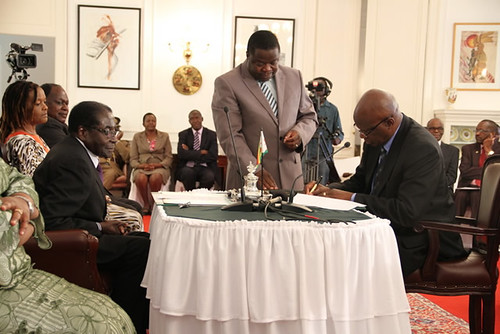
Minister of Finance Patrick Chinamasa being sworn in to a new cabinet post for the Republic of Zimbabwe. The ceremony took place on September 11, 2013., a photo by Pan-African News Wire File Photos on Flickr.
Multi-currency regime to stay for 5 years: Chinamasa
Sunday, 03 November 2013 00:00
Zvamaida Murwira in Victoria Falls
Zimbabwe Sunday Mail
Zimbabwe will continue using the multi-currency system for the next five years and chances are Government will increase the number of currencies being used as legal tender in the country, Finance Minister Cde Patrick Chinamasa has said. Speaking at a pre-budget seminar here yesterday, Cde Chinamasa disclosed that the multi-currency system will form the basis of Government’s economic policies over the next five years.
“The multi-currency system will remain for the next five years. I do not want to continue being asked that question. It is going to be a multi-currency regime,” he said.
“The multi-currency system will be the form and basis of our programmes for the next five years. Let that be clear to everybody. We might actually add more currencies to the cocktail of the currencies we are using now, depending on how that currency will be benefiting the country.”
Cde Chinamasa highlighted that policy consistency will be evident in all Government programmes, adding that some of the issues they are seeking consensus on include indigenisation and land tenure.
Turning to industry, Cde Chinamasa conceded that there is need to revive industries in Bulawayo, but was quick to point out that equal focus is also needed in other cities.
“The de-industrialisation is countrywide, not only in Bulawayo. I know of four towns where you will not find smoke coming out from their industrial areas.
“Talk of Rusape, Mutare, Marondera, these are some of the towns whose industries have totally collapsed. Let us not politicise the issue,” he said.
Minister Chinamasa disclosed that work towards the revival of Ziscosteel had already commenced.
“The new investor wants a dedicated railway line for coal supplies; they want a dedicated power supply line and we are talking of dam construction, the setting up of a new power line, and that takes a bit of time.
“We need to understand that the new investor will assume debts we have and when that is done we are good to go,” he said.
Minister Chinamasa highlighted that the 2014 budget will put emphasis on supporting the small to medium- scale enterprises and the agricultural sector.
“The SMEs are now more than the industries. The finance sector is failing to lend them money, but we want to support them and help them grow.
“The same goes for the tobacco farmers. There were 2 000 farmers in the year 2000, but after the land redistribution exercise, there are now 19 000 farmers and they also need to be supported,” said Minister Chinamasa.
He noted that Zimbabweans need to work towards changing the negative perception that the international community has of the country.
“I am told that if we go and borrow funds, we are charged 7 percent more (interest) than other countries because of negative perception and this is done through middlemen who put their mark-ups. So let’s work on confidence-building measures so that we have a new image of our country.”
Cde Chinamasa is expected to present the 2014 national budget later this month.
No comments:
Post a Comment